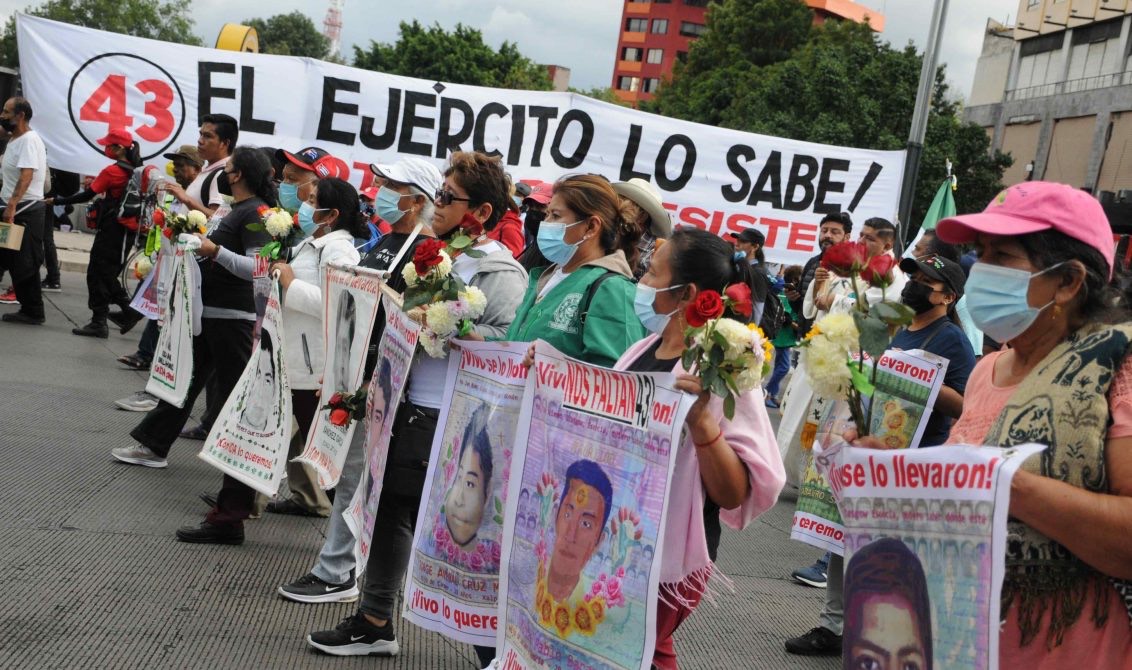AYOTZINAPA: Will Justice Prevail?

By Analy Nuño, journalist
Ed. Note: article edited for length
When Clemente Rodríguez imagines seeing his only son Christian again, he envisions an encounter on a Mexican beach, or a chance meeting on the streets of his home village. Maybe his son will have a beard; after eight years, he’s bound to have changed. “I tell my wife that when I see him, I’ll have heartache from sheer joy,” says Rodríguez.
Christian was last seen alive in September 2014, when he and other student teachers from the Ayotzinapa rural teachers’ college in southern Mexico commandeered a fleet of buses to take them to a demonstration in the capital. Hours later, the 43 students were ambushed and abducted by local police working alongside a local cartel called Guerreros Unidos. Most of them vanished entirely, in one of the most notorious and baffling atrocities in Mexico’s. recent history.
Scores of suspects, including local politicians, government officials and cartel thugs have been detained. Arrest warrants have been issued, but there have been no convictions, and the fate of the students remains unknown. In late August, however, faint hopes were raised that there might be some answers. A government truth commission appointed by President Andrés Manuel López Obrador released a 108-page report which concluded that the mass disappearance was a state-sponsored crime involving federal and state authorities at the highest levels of government. The commission also made the startling revelation that six of the students were kept alive for several days after their abduction before being put to death on the orders of a Mexican army colonel.
Days after the report’s publication, federal agents arrested former attorney general Jesús Murillo Karam – who oversaw the original investigation – on charges of forced disappearance, torture and official misconduct. Arrest warrants were also issued for 83 others, including soldiers, police officers, Guerrero officials and gang members. The developments offered some hope that the case may finally be solved – but by pointing the finger at high-level military officers and officials from the previous government, it also represents a challenge for López Obrador.
The president, popularly known as Amlo, promised to “reach the truth” in the case. But he was quick to say that Peña Nieto was not himself under investigation and added that any future decisions over the case would be up to the magistrates leading the investigation.
His comments have failed to dampen accusations that once again, politics has been prioritized over justice. “Just as politics helped shut down the case in 2014, politics is shutting it down again in 2022,” said the author and journalist Ricardo Raphael. “It’s hard to conclude that Murillo Karam came up with this official version on his own. The story was produced in Los Pinos [the former presidential residence] – not in the prosecutor’s office.”
Investigators now appear to be focusing on the theory that – unknown to the students – one of the commandeered buses was carrying a hidden shipment of heroin, which had been allowed to pass police and cartel checkpoints – and which the corrupt police officers were dispatched to recover.
But for relatives of the missing students, the priority remains simple: finding out what happened to their loved ones. Last week the families called on the truth commission to allow independent experts from the Inter-American Commission on Human Rights to examine its evidence. “We need undeniable scientific evidence of the whereabouts of our sons. We can’t go home with just preliminary findings which do not reveal where they are – and what happened to them,” the families said in a statement.
One possible step towards that truth would be the arrest of Peña’s close ally Tomás Zerón, the former director of the attorney general’s criminal investigation agency (AIC). Zerón was forced to resign after video emerged of him torturing suspects in the case of the 43 students, and he was accused of tampering with evidence. He was then named as Peña Nieto’s security adviser, but fled to Israel to escape charges of kidnapping, torturing suspects, manipulating evidence and embezzling about $50m of public funds. Zerón denies the allegations.
“If Zéron is captured, the trail to Los Pinos will become clear. The investigators will have to follow it, and it will be hard to avoid looking into the role of Peña Nieto and his circle,” said Raphael.
Mexico has repeatedly called on Israel to hand over Zerón, despite the lack of an extradition treaty between the two countries, and last week, the foreign minister, Marcelo Ebrard, said that he could be returned to Mexico within days.
In his state of the nation address on September 01, Amlo mentioned Ayotzinapa and again pledged that there would be no impunity for the perpetrators.
But any arrests must be supported by evidence that will stand up in court, warned Raphael, adding that justice will only be achieved when those responsible for the atrocity are tried and convicted. Until that day comes, relatives of the missing students will continue fighting, said Rodríguez. “This whole time has been an emotional and psychological hell,” he said.
In 2020, government investigators told Rodríguez that DNA from a fragment of bone found at the dump in Cocula matched that of his son. But despite that finding – and the conclusion of the truth commission that there is no evidence to suggest the students are alive – Rodríguez refuses to let go of hope. “Until I see a body, my son is still alive,” he said. “My son was whole when they took him, and if they say he’s no longer alive, then they should catch whoever was responsible – and return me his body.”
Source: The Guardian, 9/6/22
